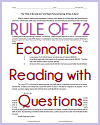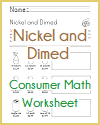| Money and Personal Finance Vocabulary Terms Worksheet |
| www.studenthandouts.com > Social Studies > Economics > Money and Personal Finance |
|---|
 |  |
|---|
|
Click here to print. Answers will vary. Terms: consumer debt, hedging, managing risk, mutual fund, net asset value, prime rate, thrifts. A mutual fund is a type of investment vehicle that pools money from multiple investors to purchase a diversified portfolio of securities, such as stocks, bonds, and other assets. Managed by professional portfolio managers, mutual funds aim to achieve specific investment goals, such as income generation, capital appreciation, or risk mitigation. The fund's assets are collectively owned by the investors, who hold shares in the mutual fund proportional to their investment. Investors in a mutual fund benefit from diversification, which helps spread risk across various securities and sectors, reducing the impact of any single investment's poor performance on the overall portfolio. Mutual funds also offer liquidity, as investors can typically buy or sell shares at the fund's net asset value (NAV) at the end of each trading day. There are various types of mutual funds, including equity funds, bond funds, money market funds, and balanced funds, each with different risk levels and investment strategies. Equity funds invest primarily in stocks, bond funds focus on fixed-income securities, money market funds invest in short-term, low-risk instruments, and balanced funds combine stocks and bonds to balance risk and return. Mutual funds provide a convenient and accessible way for individual investors to participate in a diversified and professionally managed investment portfolio, making them a popular choice for long-term investment goals, such as retirement planning. |
|---|
 |
 |
 |
 |
 |
 |
|---|
| www.studenthandouts.com > Social Studies > Economics > Money, Finance, & Personal Finance |









